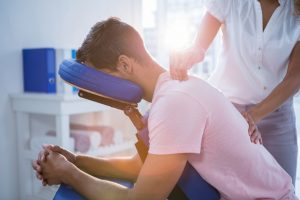Chronic back pain can be considerably frustrating and debilitating. Back pain is usually not a serious issue, but if it lasts for more than a few months, then it becomes a chronic condition.
Aside from age-related factors, certain medical conditions cause chronic back pain:
- Slipped disc – a disc of spinal cartilage presses against a nerve, causing pain and numbness.
- Sciatica – an irritation of nerves that run from the lower back to the feet. Pain, numbness, and weakness in the lower area of the body are common.
- Arthritis of the spine – the cartilage inside the spinal column gradually thins out.
There are many cases in which it is difficult to identify the exact cause of the pain. As such, most back pain is classified as non-specific.
Aside from seeking out your doctor’s advice, it can be worthwhile to see a back pain specialist. If you have scoliosis and also experience some back pain, you should also consult a scoliosis expert or specialist.
Additionally, these non-surgical treatments will help you recover and make chronic back pain more manageable.
Physical activity
Movement is at the core of chronic back pain treatment. Exerting a good amount of pressure through exercise is good for your spine and helps improve blood flow throughout the body.
Before engaging in any form of physical activity, make sure to consult medical expertise. Without proper guidance, you could potentially apply too much strain on your back. Additionally, a certain set of exercises might not work well with your specific condition.
Your physiotherapist might recommend aerobic exercises, core strengthening, or flexibility-based workouts.
Lifestyle changes
Patients who have never had chronic back pain before (or a similar condition) can feel like they are being held back from enjoying their normal lives. It’s crucial to accept the reality of the condition and do what you can to adapt.
For instance, if you used to be a high-performing athlete before the condition, you will most likely need to scale down your activities. This will depend on the type of sport you’re engaged in and the advice of your therapist.
If you used to be fairly proficient with doing household chores, you might need to relinquish some or most of your duties to other family members.
However, do remember that it’s not the end. As you get stronger week by week, month by month, you might eventually get back to doing your usual activities.
 Medication
Medication
If pain is significant, you can be allowed to take non-steroidal anti-inflammatory drugs (NSAID) like ibuprofen. Muscle relaxants can also be appropriate if painful muscle spasms are too much of an inconvenience.
However, NSAIDs and muscle relaxants are not ideal for everyone. Some people will get addicted to these drugs or will experience blurred vision and dizziness.
As always, be sure to consult your doctor or therapist. Don’t consume medication that isn’t cleared by the experts. Additionally, when going out to buy approved medication, clarify with the attending pharmacist if you are purchasing the right medicine.

